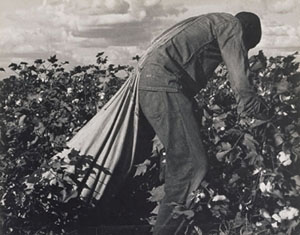A man is shown stooped over in a field of cotton. The horizon line is high, making the worker appear monumental as he goes about his work in the strong sunlight. The bag he is dragging looks very heavy. Yet Lange's photograph makes the difficult, exhausting work look graceful, and the coarse cloth of his overalls and heavy bag seem to crease and hang in beautiful ways.
In the revised and expanded edition of An American Exodus (1969), this picture is accompanied by a caption from Paul Taylor's field notes: "Migratory cotton pickers paid 75 cents per 100 pounds. A good day's pick is 200 pounds. CIO union strikers demand $1 per 100 pounds." Workers who were paid by the day lacked job security and were forced to move their families again and again in search of work.
The work of picking cotton occupies a chapter of John Steinbeck's 1939 book about migrant life in California, The Grapes of Wrath. Like other seasonal labor, it was a possibility for his Joad family, who had fled the Dust Bowl conditions of Oklahoma. In a conversational style, seemingly from the migrant picker's viewpoint, Steinbeck describes the process: "Now the bag is heavy, boost it along. Set your hips and tow it along, like a work horse. And the kids pickin' into the old man's sack. Good crop here. Gets thin in the low places, thin and stringy. Never seen no cotton like this here California cotton." |
